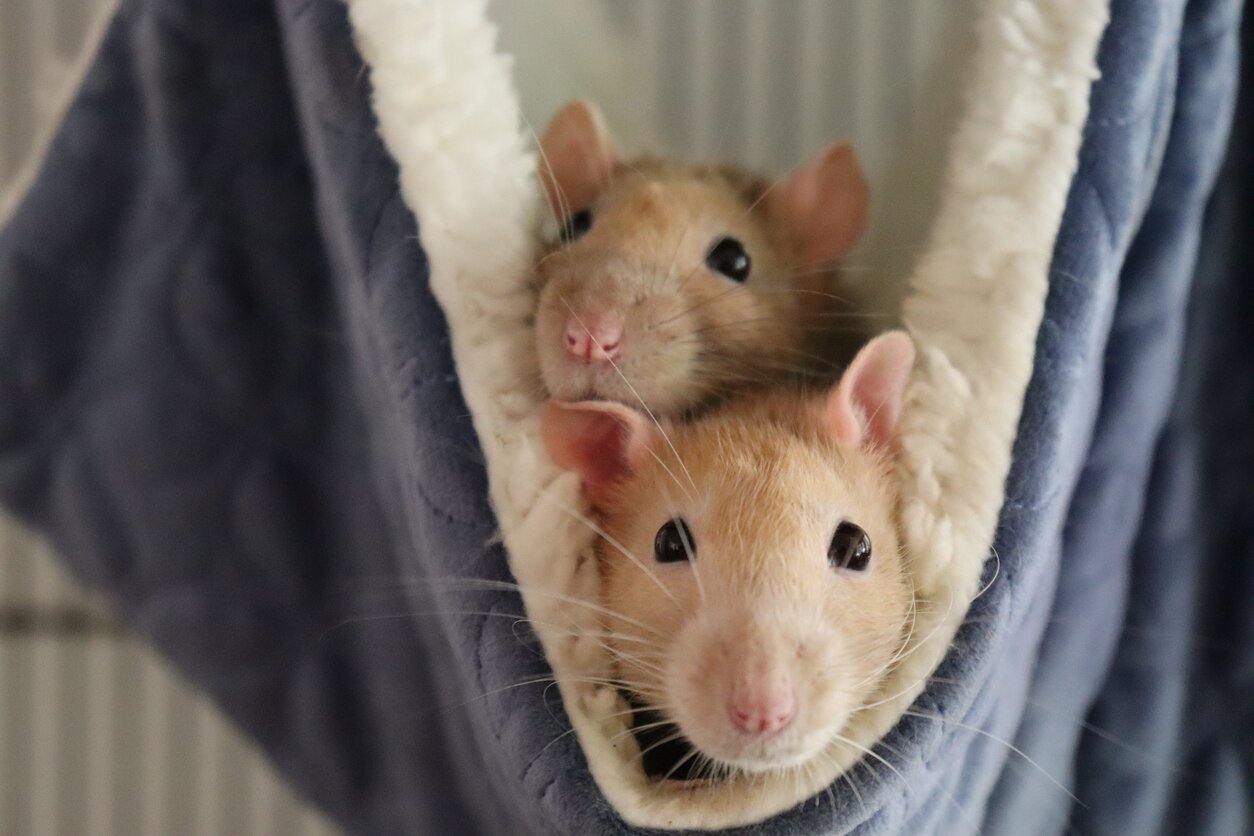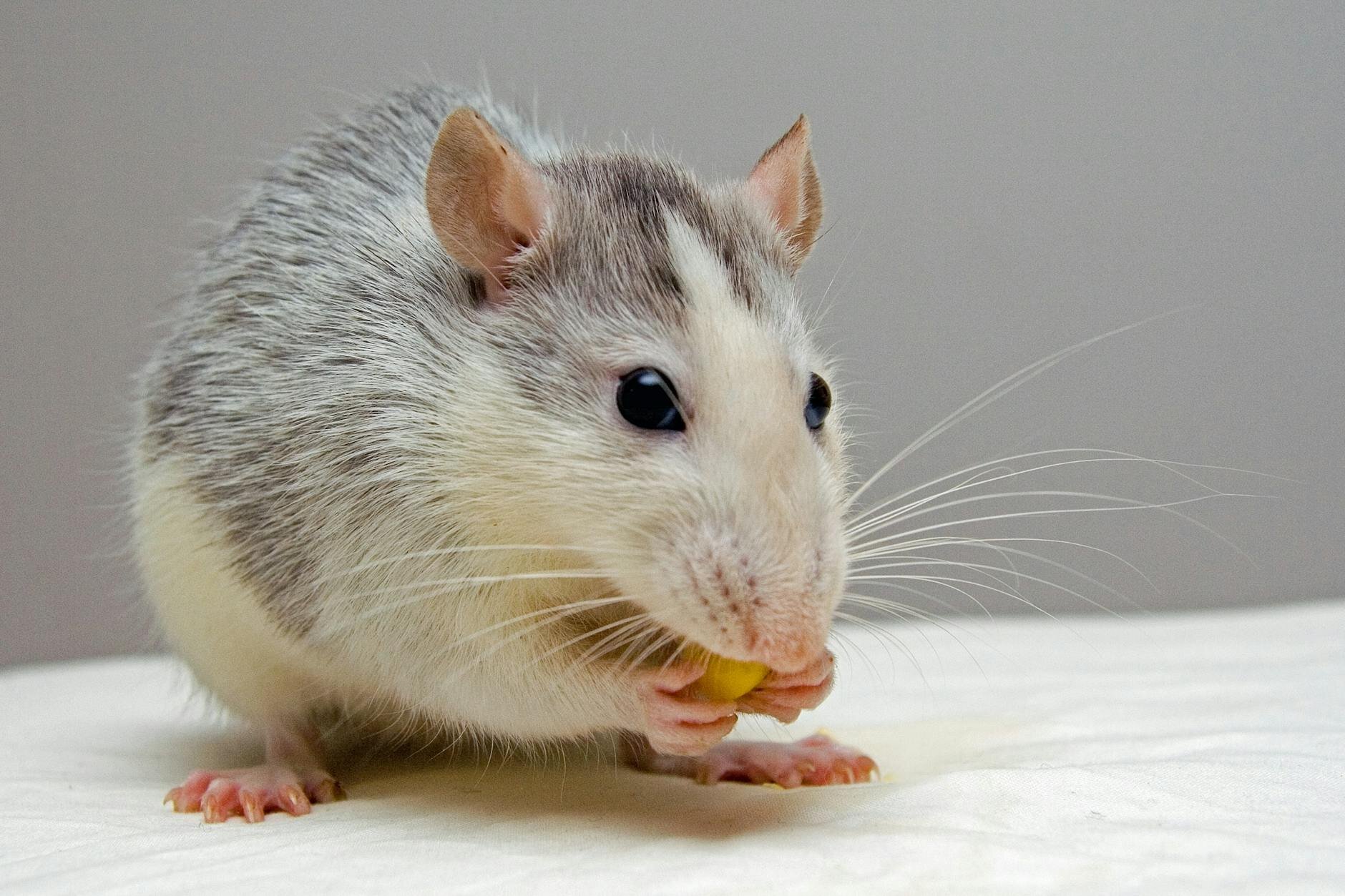Last Updated: 06/06/2025
Rat Care Guide
Thinking about getting a Rat as a pet? This guide covers everything you need to know including diet, preventative health, enrichment, training and general tips to keep your rat happy and healthy.
Author: Gemma Radcliffe
Reading Time: 22 minutes - medium read
Squeak! While some people might think of rats as dirty little critters that like to chew on wires, we think the complete opposite here at Pet Circle. Pet rats are affectionate, highly intelligent and downright adorable creatures that make great pets, but can be rather misunderstood from time-to-time...
With rats' bad rap coming from the devastating effects of the Black Death in the 1300s (it was the fleas, darn it!), many people get their rat facts mixed up. For example, did you know that rats are super clean? And that they are highly intelligent and able to be trained to do tricks? If you think you'd love to have one of these smart creatures by your side, read on and discover our beginner's rat care guide.
Finding your furry friend
Like most pets, rats are available to be adopted from rescue groups - you may just have to do some clever hunting, as they aren't as popular as cats and dogs. Alternatively, you can seek out a registered breeder to ensure that your new companion is healthy and free from diseases. Look up your local Rodent Fanciers Society to get in touch with some reputable breeders. Take care when adopting rats from a pet shop, as their health, breeding and temperaments are often unknown.
When choosing a rat look for the following:
- A shiny clean coat with no patchy fur loss
- Clear bright eyes without discharge
- Clear nostrils without discharge or sneezing
- Clean feet without sores or redness
- Active and curious temperaments
- Well formed poops
There are a few other things to consider as well when looking for a pet rat, such as what gender you will choose. Males tend to be more affectionate, but desexing is a good idea to prevent spraying and fighting. Female rats are much smaller, highly active and enjoy building and snuggling in their little nests. Whichever gender you choose, it's best to stick with all males or all females to prevent unwanted pups and minimise stress in your mischief (that's what a group of rats are called!).
Get them a companion

You probably noticed that we just said "all males" or "all females"...that's because you should never own just one rat. Like guinea pigs, rats are highly social animals, and do better with at least one or two ratty friends. Rats of the same sex can get along just fine so long as they have been introduced properly or have grown up together. Desexing, whether surgically or chemically can help to reduce any hormonal aggression and promote better relationships in rat groups. On their own, rats will develop depression and anxiety, so make sure you adopt or buy a pair or group to ensure a happy family.
Get the right supplies
It's important to get the right supplies, when bringing your rats home. Rats are very clean, interactive and affectionate, which is why they make such great pets! We recommend you grab the following essentials before bringing your new rodent home:
Caring for your rat

Nutrition
When it comes to your rat's diet, you'll be surprised at what's on the menu! Rats are omnivorous, so they enjoy a varied diet comprised of pellets, fresh vegetables, fruits, wholegrains, healthy fats and small amounts of animal protein like fatty fish. And of course, always be sure to supply fresh drinking water, which can be provided in both bottles and ceramic bowls.
Unfortunately many pet rats are prone to developing obesity, due to their genetics and selective eating habits. Offering a a healthy diet, full of high fibre vegetables from a young age can help encourage good eating habits.
A good quality, balanced diet will play an essential role in your rats' health and can even reduce the risk of common illnesses like respiratory disease. The diet should consist of:
- Pellets: One to two tablespoons of premium formulated pelleted diets such as Vetafarm Origins or Science Selective a day. Avoid feeding grain mixes as a complete diet, as they are often too high in fat and sugar.
- Veggies: A bowl of fresh vegetables twice a day such as: asian greens, herbs, kale, collard greens, broccoli, celery, spinach, green beans etc
- Fresh fruit such as berries, apple, banana and pear can be fed in smaller amounts, no more than 10% of the overall diet due to high sugar content.
- Healthy wholegrains and fats can make up to 10-15% of the diet eg quinoa, oats and soaked chia seeds.
- Treats: such as cooked meat, and fatty fish like salmon as well as treats like nuts and yogurt drops can be fed in moderation one to three times a week but only in small amounts.
You should avoid feeding your rats sugar rich muesli and seed mixes. These promote obesity and related health issues. They are also deficient in many essential nutrients including vitamins and minerals that your rats need for good health and increase the risk of illnesses like respiratory disease.
Grooming
Rats are actually very clean critters and generally take care of grooming themselves.
Nail clipping is not usually necessary. However if your rat is not particularly active, or does not have toys and surfaces that naturally wear down their nails, they may become overgrown. Their nails can be clipped using Small clippers for puppies and kittens. However, it is challenging and we recommend getting your veterinarian to help you with this.
Parasite prevention
Rats don't generally routine parasite protection but at times they can become afftected by parasites such as mite and lice infestations. These can be treated with very small doses of Revolution - but you must be careful that you don't over-treat your little companion, so make sure you always consult with your vet before use.
To reduce the risk of reinfestation and to keep your rat's enclosure clean i general consider using a veterinary safe disinfectant to help with routine disinfection of their enclosure.
Health
Did you know rats can be sterilised? Sterilisation helps reduce the risk of infighting, prevents unwanted pregnancies, and reduces the risks of reproductive cancers. Speak to your veterinarian to discuss these procedures in more detail.
As a prey species, rats are very good at disguising signs of illness, pain or discomfort, until they are extremely unwell. Unfortunately, rats age much faster than many other animals and as such they should have a health check with a veterinarian at least every 6 months.
Rats are particularly prone to respiratory diseases and mammary tumours. Keeping a clean enclosure, free of dust and excessive ammonia build up is very important. In addition frequent handling of your rat can help you to identify any abnormalities such as unusual lumps and bumps. Always seek assistance from an experienced veterinarian if you have any concerns about your rats health or behaviour.
Training
Would you be surprised if we told you that you can not only litter train your rat, but also clicker-train them and teach them to recognise simple words? Rats are intelligent and love to run obstacle courses, and of course are happy to cuddle so long as you approach them gently (never pick a rat up by its tail!).
Further Reading
Want to read more? Check out our other articles:
Respiratory Disease in Rats and Mice
Top Tips to Get Your Pet to Eat More Hay
History
Our experts continually monitor the health and wellness space and we update our articles when new information becomes available.
Fri Jun 6 2025
Edited by Dr Teagan Lever BVSc (Hons)Medically reviewed by Dr Olivia Clarke BSc BVMS MANZCVS (Unusual Pets, Avian)Gemma Radcliffe
Contributing Author
In her life, Gemma has owned cats, dogs, budgies, tropical fish, hermit crabs, chickens, guinea pigs, a rabbit and a stubborn rat named Bijou.

